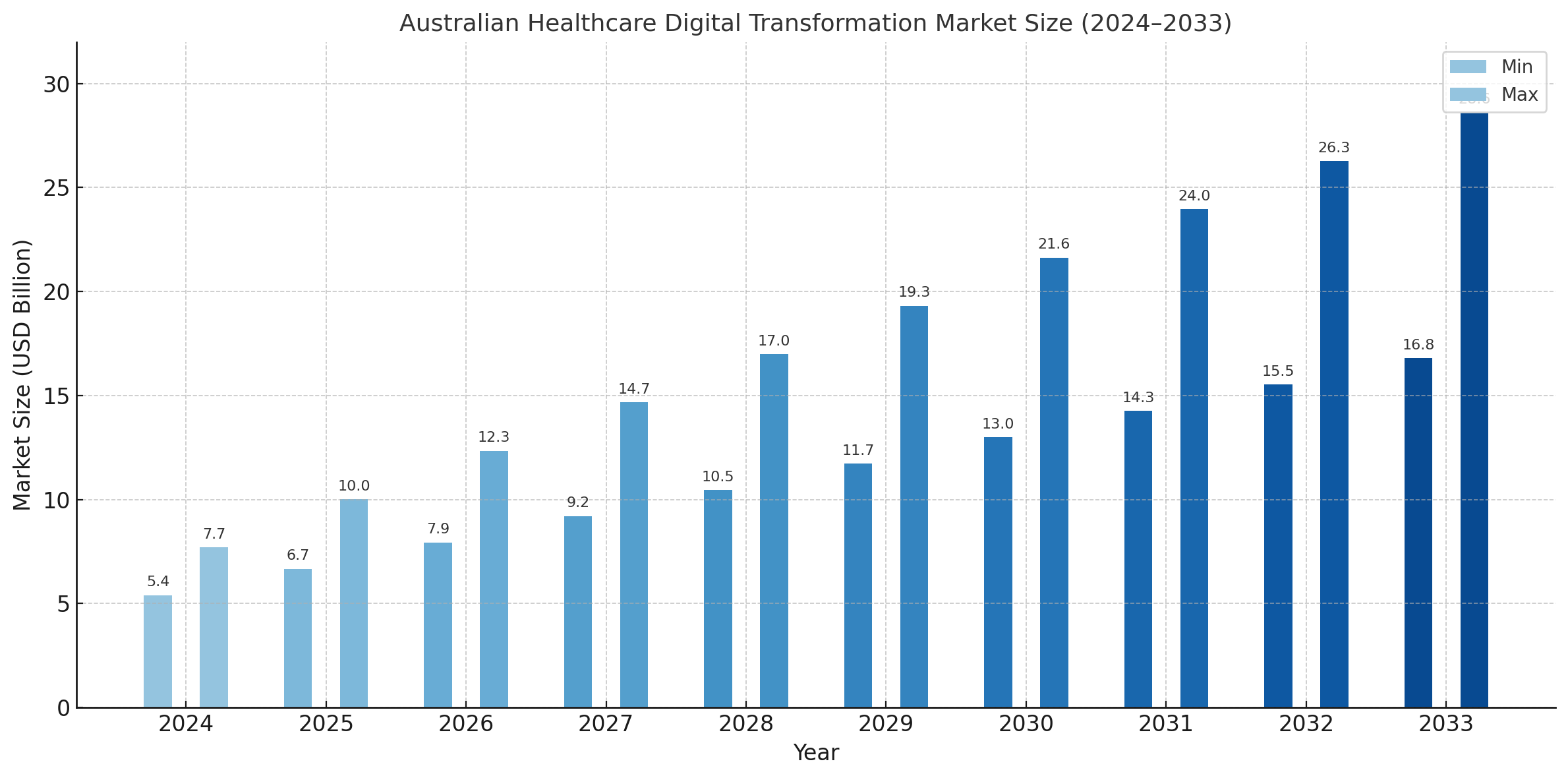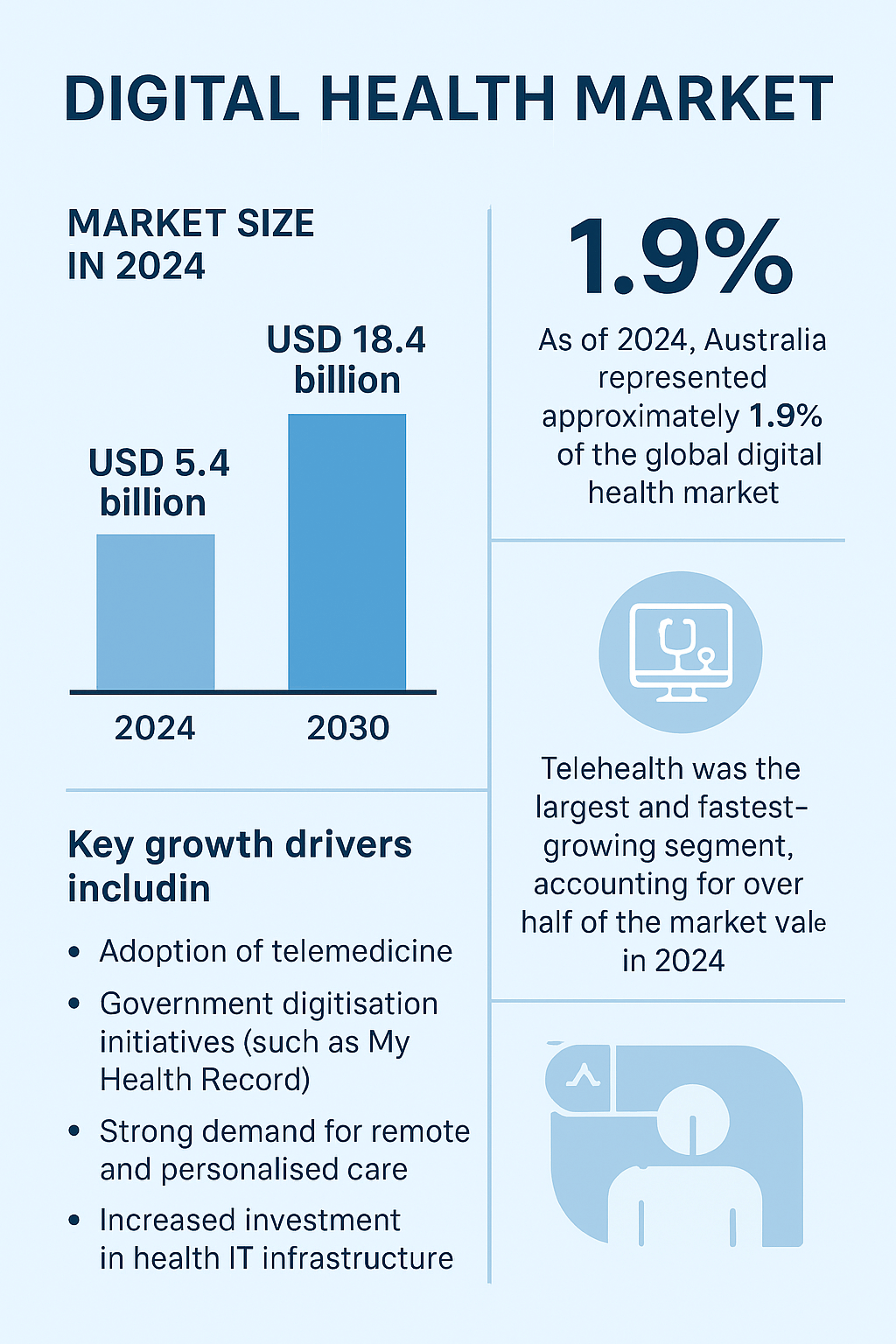Did you know? Too many healthcare providers in Australia are still relying on outdated systems. Delayed reports, scattered records, limited patient access, and rising operational costs are all signs of that gap.
The result? Poor coordination, frustrated patients, and teams constantly playing catch-up.
Based on our recent case studies, over 68% of clinics using manual workflows reported longer diagnosis cycles, missed follow-ups, and a 17% drop in repeat patient visits.
But here is major shift that is happening now- clinics and hospitals that adopted digitalisation in healthcare saw a 34% improvement in appointment scheduling accuracy, faster diagnostics, and a 22% rise in patient satisfaction within 45 days.
So, this post breaks down how digital transformation in healthcare industry works, and how partnering with Vrinsoft Pty Ltd, the top digital transformation services company will help you fix what is broken with your healthcare business and improve patient care without burning out your team.
What is Digital Transformation in Healthcare?
Digital transformation in healthcare involves adopting and integrating digital technologies to improve all aspects of healthcare delivery, including patient care and operational efficiency.
Some key developments include: –
- Electronic medical records
- Telehealth consultations
- AI-powered diagnostics
- Mobile health applications
- Wearable devices
These technologies improve access to care, especially for individuals in remote or regional areas. They also simplify healthcare workflows and empower patients to take a more active role in managing their health.
Some additional benefits of digital transformation in healthcare include reduced errors, improved data sharing, proactive and preventive care, and increased cost efficiency.
The Australian government supports this transformation through significant investments and national digital health strategies that focus on interoperability, data security, and improved health outcomes.
Healthcare Digital Transformation Market Size in Australia
Have a look at the rising healthcare digital transformation services market in Australia: –

- The Australian healthcare digital transformation (digital health) market reached between USD 5.4 billion and USD 7.7 billion in 2024.
- By 2033, projections suggest that the market will grow to between USD 16.8 billion and over USD 28.6 billion, depending on the methodology and definitions used.
- The sector is experiencing rapid growth, with compound annual growth rates (CAGR) estimated between 12% and 22.9%.
- Most credible market analysts estimate the CAGR to be around 15-16% over the next decade.
Key statistics for the Australian digital health market include: –
 Market size in 2024- USD 5.4 billion to USD 7.7 billion
Market size in 2024- USD 5.4 billion to USD 7.7 billion- Projected market size in 2030- USD 18.4 billion
- Projected market size in 2033- USD 16.8 billion to USD 28.6 billion
- Telehealth was the largest and fastest-growing segment, accounting for over half of the market value in 2024.
- Key growth drivers include the adoption of telemedicine, government digitisation initiatives (such as My Health Record), a strong demand for remote and personalised care, and increased investment in health IT infrastructure.
- As of 2024, Australia represented approximately 1.9% of the global digital health market.
These figures reflect a strong nationwide commitment to digitalisation in healthcare, with significant emphasis on telehealth, mobile health (mHealth), healthcare analytics, and digital health systems.
The expansion is further supported by both public and private investment, regulatory backing, and a continuous need for improved access to services in rural areas.
When Digital Transformation For Healthcare Becomes Essential?
Digital transformation is essential for healthcare in Australia due to the urgent need to improve patient care, increase operational efficiency, and tackle systemic challenges that traditional methods struggle to address.
Digital technologies facilitate more integrated, accessible, and secure healthcare services, which are crucial as the demands on the system continue to grow. The Australian healthcare industry faces several challenges that necessitate investment in digital transformation for healthcare, including: –
1. Interoperability Issues
- Different healthcare systems and software often struggle to share or communicate patient data seamlessly, resulting in information silos that hinder coordinated care.
- Digitalisation in healthcare and standardisation is essential for effective data exchange.
2. Data Security and Privacy Concerns
- Protecting sensitive patient information from cyberattacks and data breaches is essential.
- Healthcare organisations must comply with stringent privacy regulations and implement robust cybersecurity measures.
3. Resistance to Change and Adoption
- Some healthcare professionals may be hesitant or lack training to adopt new technologies, which can affect the success of digital initiatives.
4. Limited Resources and Infrastructure
- Many healthcare providers encounter financial constraints and lack the necessary infrastructure, especially in rural or remote areas, limiting their ability to adopt new technologies.
5. Health Inequality and Access
- Disparities in internet access, digital literacy, and availability of devices prevent equal access to digital healthcare across different populations.
6. Complex Regulatory Environment
- Variations in regulations related to digital health products and patient data management create barriers to implementation and scaling.
7. Fragmented Healthcare Ecosystem
- The involvement of multiple stakeholders, including hospitals, payers, pharmaceutical companies, and government agencies, each with their own systems and priorities, complicates unified digital transformation efforts.
Why Digital Transformation Services in Healthcare Important?
Digital transformation services in healthcare are essential in Australia as they significantly improve patient care, improve accessibility, and increase efficiency within the healthcare system.
These technologies facilitate faster diagnoses, better resource management, and more personalised treatments across both urban and remote areas.
Given below are some important reasons why a digital transformation strategy in healthcare is important: –
1. Faster, Safer Care
Electronic medical records (EMRs) and AI diagnostics provide quicker and more accurate access to patient data, leading to improved treatments and a reduction in errors.
2. Improved Accessibility
Telehealth and remote monitoring address the vast distances in Australia, delivering quality care to rural and remote populations.
3. Cost Efficiency
Automation minimises paperwork and operational costs, saving money for both healthcare providers and patients. So, partner with the right digital transformation consultant.
4. Proactive Care
Wearable devices and health apps allow for early detection and prevention of health issues, reducing hospital admissions.
5. Better Coordination
The ability to share digital patient information reduces duplicated tests and minimises the risk of adverse drug events, thereby improving care continuity.
6. Greater Patient Engagement
Healthcare digital transformation tools empower patients to improve their health literacy and manage their conditions more effectively.
7. Operational Benefits
Digital technologies simplify workflows, enhancing staff productivity and reducing wait times.
8. Secure Data Management
It is one of the important digital healthcare benefits.
Strong cybersecurity measures protect sensitive health information while ensuring seamless access for healthcare providers.
10 Digital Transformation Strategies For Australian Healthcare Providers
The Australian healthcare sector is quickly changing through digital transformation, aimed at improving patient outcomes, simplifying operations, and enhancing data security. These strategies for digital transformation in healthcare industry leverage technology to create a connected, consumer-centric, and efficient health system that benefits both providers and patients.
Some of these strategies are: –
- Personalised, Patient-Centred Care
- Enhanced Patient Engagement
- Electronic Health Records (EHR) Integration
- Interoperability Enhancement
- Telehealth Expansion
- Data-Driven Decision Making
- Digital Literacy Training
- Security and Privacy Focus
- Innovation and Collaboration
- Sustainable and Inclusive Systems
Let’s discuss in detail about these 10 strategies and the significance of digital transformation in healthcare Australia: –
1. Personalised, Patient-Centred Care
Customising digital transformation healthcare services to meet individual needs by using data analytics and digital tools offer better health outcomes.
2. Enhanced Patient Engagement
Utilising apps and portals will empower patients by giving them access to their health data and supporting self-management.
3. Electronic Health Records (EHR) Integration
Adopting the latest digital transformation services and expanding the adoption of EHRs will ensure seamless access, accuracy, and sharing of patient information across different providers.
4. Interoperability Enhancement
Developing national standards and platforms, such as Health Connect Australia, will allow for secure and efficient health information exchange.
5. Telehealth Expansion
Increasing remote consultation capabilities will improve access to healthcare, especially for rural and underserved populations.
6. Data-Driven Decision Making
Use of a digital transformation strategy will include, employing big data and artificial intelligence (AI) to support clinical decisions, resource allocation, and health policy formulation.
7. Digital Literacy Training
Providing education for both healthcare workers and patients will ensure effective use of digital tools.
8. Security and Privacy Focus
Implementing robust cybersecurity measures will protect sensitive health information while complying with privacy regulations.
9. Innovation and Collaboration
Encouraging partnerships between the government, healthcare providers, and technology developers will promote continuous improvement and the adoption of new technologies.
10. Sustainable and Inclusive Systems
Ensuring digital health solutions are accessible and equitable, will address disparities in healthcare access and outcomes.
Also Read– 14 Digital Transformation Examples That are Redefining in Business 2025
5 Successful Healthcare Digital Transformation Examples
Five successful examples of digital transformation in healthcare in Australia demonstrate how technology can enhance patient care, improve operational efficiency, and increase accessibility.
 1. Queensland Health
1. Queensland Health
It is a leading digital transformation in health care example.
It implemented a state-wide integrated electronic medical record system (ieMR) across 15 hospitals. This system allows for smooth patient management and offers virtual care services, such as telehealth and remote monitoring.
This effort toward digital maturity supports improved health outcomes and operational agility.
2. Princess Alexandra Hospital
As Australia’s first large digital hospital, Princess Alexandra Hospital focused on transformation of healthcare and adopted advanced electronic medical records that include ePrescribing, clinical decision support, and analytics.
This initiative promotes a unified digital health ecosystem.
3. VitalCare Network
This healthcare provider improved accessibility and efficiency through a comprehensive digital health platform.
By utilising AI-driven diagnostics, telehealth services, and IoT devices for real-time patient monitoring, they have expanded their reach into rural areas and improved outcomes by 30%.
4. Healius
Healius underwent a significant digital transformation to upgrade its technology and digital presence, leading to enhanced patient engagement and delivery of care.
5. NSW Health
This organisation focused on creating a digitally enabled and sustainable healthcare system that prioritises outcomes that matter to patients.
Their efforts include the implementation of digital record systems and automated workflows.
The Future of Digital Transformation in Healthcare Australia
The future of digital transformation in healthcare in Australia focuses on the development of secure, connected, and consumer-cantered digital health systems.
The Australian Digital Health Agency’s Health Connect Australia program, scheduled for 2025-2030, aims to improve access to health information, improve interoperability, and empower patients to take control of their healthcare data.
Electronic health records (EHR) are crucial for improving patient care, reducing errors, and enabling seamless data exchange between healthcare providers.
The National Digital Health Strategy 2023-2028 is internationally recognised for its innovation and comprehensive approach, promoting sustainability, inclusivity, and integration across various healthcare sectors.
Future trends in Australia include personalised medicine, the integration of telehealth, artificial intelligence (AI), and blockchain technologies, all of which will drive efficiency and lead to better health outcomes nationwide.
This digital transformation in healthcare also emphasises the importance of bridging gaps in digital literacy and ensuring equity for all Australians.
Get Result Driven Healthcare Digital Transformation Services From Vrinsoft
If you are ready to improve care, simplify operations, and cut down inefficiencies, Vrinsoft is ready to guide you through it. With 15+ years of experience, 500+ successful deployments, and 200+ clients across Australia and beyond, we know what works and what doesn’t.
Our team understands the real challenges healthcare providers face. We deliver practical solutions through the digitisation of healthcare, without disrupting your existing workflows. Whether you are planning your first upgrade or looking to improve what you already have, our portfolio proves consistent results.
As a leading digital transformation services provider, we are trusted by clinics, hospitals, and medical businesses who have chosen us among many digital transformation services companies.
Partner with a proven digital transformation agency offering top-tier digital transformation services in Australia and focused medical digital transformation strategies.
Note That- “Change doesn’t wait- neither should your care system’’
Let’s talk. We will help you fix the gaps and build what’s next.
Contact
Call- 0480027297
Email- sales@vrinsoft.com.au





